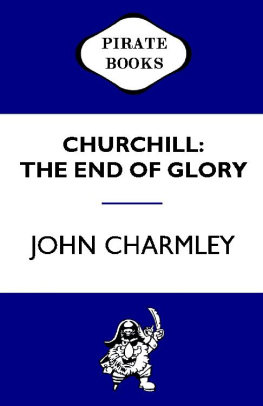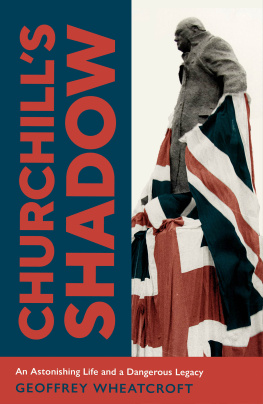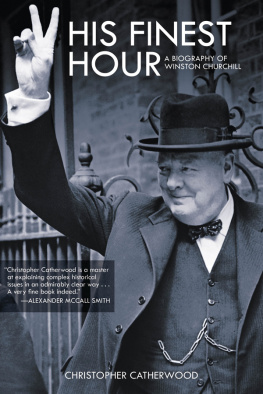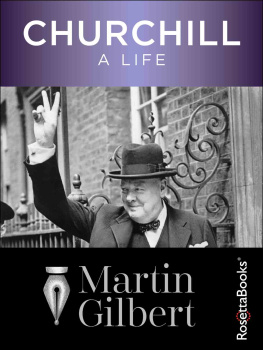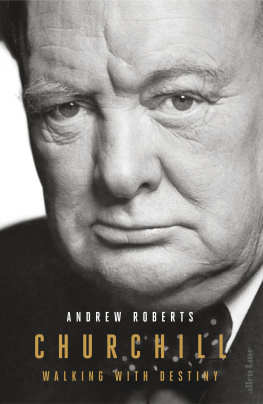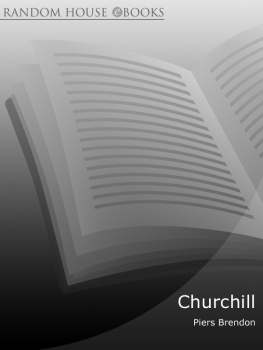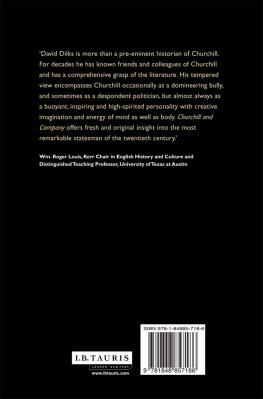Churchill:
The End of Glory
A Political Biography
JOHN CHARMLEY

Acknowledgments
This time there is no copious list of illustrious names to thank for telling me stories which already appear in their memoirs; I deliberately avoided seeking interviews with what Sir John Colville called Churchillians. In the course of my researches over the last fifteen years it became clear to me that just about everyone of the war generation to whom I talked had been touched by the Churchill myth. As I already knew what that was, I deliberately avoided exposing myself to any more of its manifestations, preferring, instead, to immerse myself in the archives, Churchills writings and the works of others the result can be seen in the form of the bibliography.
But that does not mean that there are no acknowledgments quite the contrary. I am grateful to everyone who has spoken to me about this period and especially to those who have let me examine and quote from their private papers. Particular thanks are due to Julian Amery (Leo Amery), John Harvey (Oliver Harvey), Paul Channon (Sir Henry Channon) and Dr B. Z. Benediktz (Chamberlain and Avon Papers). Copyright for the Churchill Papers is owned by C&T publications, but my quotations are from documents in the public domain. If I have inadvertently infringed any copyright, I hope that the owner will get in touch so that I can correct this state of affairs in any future editions. Since this book is the culmination of fifteen years work, it seems the right place to pay tribute to two historians whom I admire not only as scholars, but also as friends. Alastair Parker of the Queens College, Oxford, introduced me to the arcane mysteries of historical research on the Second World War, and although he will disagree with much of what follows, he can have the melancholy satisfaction of knowing that he helped set my feet on the road. To my former tutor, Piers Mackesy, I am grateful on two counts: if Alastair Parker guided me at a later stage, it was Piers who first showed me what an historian could be; he has put me even further in his debt by reading and commenting on parts of the manuscript. To my former colleague James Jones I am grateful for once more taking time from his labours to comment on the results of mine. My colleague Dr Geoffrey Searle has earned some sort of medal by reading and commenting on most of the manuscript heroism way beyond the call of any possible duty.
I must also acknowledge an immense debt to all the other scholars who have worked in this period; there is scarcely a book in the bibliography from which I did not learn something. Of the existing biographies, Robert Rhodes Jamess brilliant book was the one most difficult to keep a proper distance from. Like everyone else working this field I owe a debt to Martin Gilberts industry; to adapt a phrase, his biography is a quarry from which much of the stone for any other monument must be taken. Professor Warren Kimballs monumental edition of the Churchill-Roosevelt correspondence is both a quarry and a classic and, having dogged his footsteps for so long, I should like to pay a special tribute to what is probably the finest work of its kind.
I am also grateful to another group of people those who over the years have taken my special subject on Churchill at the University of East Anglia; their refusal to take anything I said for granted has been an immense stimulation. I am particularly grateful to Richard Grayson and Jane Cheadle. In previous books I have thanked the University of East Anglia for providing conditions in which serious historical research can be carried on, but given the philistine climate which now prevails in higher education, I should like to make those thanks more specific for fear that bureaucrats who deserve little but scorn might be thought to be included in a more general expression of gratitude. The University Study Leave Committee, which has sanctioned a terms leave to finish this book, and the research committee of my own school, come high up on my list, but my chief debt is to my colleagues in English history, who create an intellectual climate in which debate and discussion thrive; I count myself as fortunate in having worked with them for the past decade and more.
To my publisher, John Curtis, I have to extend my warmest thanks for bearing with me through a long period of silence and for accepting a manuscript which was three times the size of the one contracted for; his advice and support have been much appreciated. To Linda Osband, who read and commented on the massive typescript, I can offer only apologies and thanks. If they will both pardon the expression, it was nice to be working with the old firm again. I would also like to thank my agent, Felicity Bryan, for her efforts on my behalf.
Thanks of a more personal kind need to be conveyed with delicacy. A caesura in my private life makes it difficult to thank Dorothea adequately for her help, but I want to place on record my thanks to her for everything. To my sons, Gervase, Gerard and Kit, I owe an immense debt for the joy which they give me. To my brothers, David and Gary, and especially to my sister, Julie Godsell, I also owe much. If it were not for one other, I would have dedicated this book to the memory of my mother and my father to whose shades I would none the less pay homage. But since neither the author nor this book would have been here without her, it is only fitting that the final thanks should be expressed to Lorraine, to whom this book is, like its author, dedicated. Inshallah.
John Charmley, The Retreat, East Tuddenham, 1992
Preface for the 1995 Paperback Edition
What historians know and what the general public knows are often two different things. For many years, at least in the historical profession, it has been commonplace to question Churchills judgement both before 1940 and after 1945, but the central pillars of the Churchill legend, his fight against appeasement and his wartime leadership, had generally remained unchallenged, even if parts of them had been discreetly questioned in the decent obscurity of academic journals. Similarly, no one would question the fact that since the Second World War Britain has suffered a traumatic decline from her Great Power status, or that she has, to quote Dean Acheson, lost an Empire and not yet found a role. Acheson, in fact, only had it half right, Britain had in fact found a role that of the martyr-hero of 1940. Enshrined in national memory, and bolstered by Churchills noble account and by the embellishments of rose-tinted hue which retrospect often lends to events, Their Finest Hour was a national myth. To ask what part Churchills leadership had played in the decline of Britain was not done. Still less was anyone asking whether the results of 1945 had been worth the efforts of 194045? If anything were more taboo than these things, it was to ask whether some other road than the one actually followed might have been open to the British Government. The reaction to the first edition of this book shows why these questions were not asked.
When a former Government Minister, Alan Clark, wrote a piece for The Times questioning whether Britain might have made peace with Hitler in 1940 or 1941 and, in the course of it, mentioned my forthcoming book, calling it the most important revisionist text to be published since the war, the heavens seemed to fall. Alan Clark found himself being called a rich goon by a fellow Conservative MP, and he and I found ourselves under assault from every conceivable direction. When I had arrived at the Churchill Memorial in Fulton, Missouri, in August, I had been asked whether there was really any more mileage in Churchill: the furore which commenced in January 1993 gave a decisive answer to that question.
Next page
